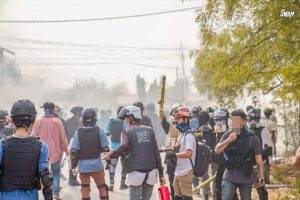Myanmar Coup: The End Of Myanmar’s Fragile Democracy?
June 4, 2021

In this panel discussion by Channel News Asia, presenter Genevieve Woo speaks with A/P Maitrii Aung-Thwin from the NUS Department of History, A/P Elliott Prasse-Freeman from the NUS Department of Sociology, A/P Eduardo Araral from the Lee Kuan Yew School of Public Policy, and Burmese activist Thinzar Shunlei Yi about the implications of the coup that occurred in Myanmar in February 2021.
A/P Prasse-Freeman revealed that what was different about the particular uprising that had happened this time around as compared to Myanmar’s previous history of civilian uprisings was that rather than being led by activists by vocation, it was more a result of concerted efforts distributed across different parts of society, especially of young women protesting in the streets for the first time. He mentioned that this could potentially lead to a reorganisation of inter-social relationships on the ground, with civilians of different classes and ethnicities coming together for the same cause.
Despite the setback the coup has had on Myanmar’s journey towards achieving democracy, A/P Aung Thwin argues that democracy still remains the aspirational target for many different groups, though not everyone shares the same viewpoint of what democracy actually means. With internal division continuing to be the biggest problem in Myanmar currently, A/P Aung Thwin suggests that the military should focus on rectifying the socio-economic foundations of the country before anyone can actually have the privilege of arguing about political ideologies.
With regards to international involvement, A/P Prasse-Freeman asserts that Aung San Suu Kyi, who was State Counsellor of Myanmar before being detained by the Myanmar military, still needs to be held accountable for previously defending Myanmar against genocide, but suspects that there will be a rehabilitation of her public image with the coup painting the military as the clear-cut villain for foreign powers to condemn.
A/P Aung Thwin also mentioned that from his observations the past 30 odd years, the Burmese military does not take action very spontaneously and hence has likely already considered the fact that the U.S. will probably focus on domestic issues rather than intervening heavily in Myanmar. Given that Western investments in Myanmar are sparse and that the West does not actually have a lot of leverage as compared to Myanmar’s much closer neighbour China, the Burmese military may simply ignore any Western sanctions imposed. Instead, they are likely to turn to other avenues such as the Asian Infrastructure Investment Bank (AIIB) for financial aid.
Both Myanmar and Singapore are part of Association of Southeast Asian Nations (ASEAN), with Singapore also being the biggest foreign investor in Myanmar. The Regional Comprehensive Economic Partnership (RCEP), a massive investment by multiple countries, including Singapore and Myanmar, was signed just six months ago, and as A/P Aung Thwin claims, ASEAN cannot afford one of their neighbours to be holding things back. A/P Araral contends that this is an opportunity for ASEAN to assert itself as the solution to this internal regional problem, but beyond that, ASEAN can also help Myanmar solve developmental issues to help them back on the road map to democracy. However, A/P Aung-Thwin points out that ASEAN is not a monolithic entity as its members have different interests and different ways of responding to the Myanmar coup.
Watch the panel discussion here.
